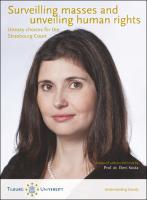Surveilling masses and unveiling human rights
Uneasy choices for the Strasbourg Court
Author(s)
Kosta, Eleni
Collection
Dutch Research Council (NWO)Language
EnglishAbstract
In this inaugural address I will first discuss the procedures in front of the UK IPT
in the 10 Human Rights Organisations case, followed by a short presentation of the
applications against actions of UK intelligence agencies in Big Brother Watch and
in Bureau of Investigative Journalism that were directly submitted to the ECtHR. I
will then turn to the issue of admissibility in secret surveillance cases, where the
victims cannot prove that they have been directly affected by the surveillance measures,
and will analyse the protection afforded by the ECtHR in light of its recent
case law. After a short presentation of Articles 8 and 10 ECHR this inaugural
address will focus on the discussion of the requirements that are established in
Article 8(2) ECHR that when satisfied, justify an interference with the right to privacy:
legality, legitimacy and necessity. The penultimate section will assess the recent
case law of the CJEU in blanket data retention and surveillance cases. Finally I will
close this inaugural address with a summary of my main findings and will conclude
with thoughts for further research that I intend to undertake in the coming years.
Keywords
human rights; surveillancePublisher
Open Press Tilburg UniversityPublication date and place
Tilburg, 2017Classification
Law


 Download
Download